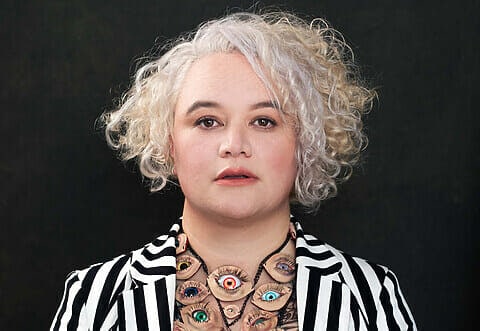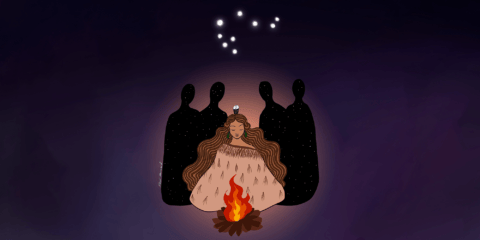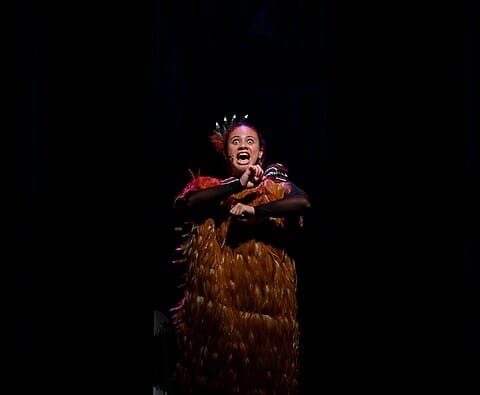A propulsive new novel by Catherine Chidgey has the makings of a Kiwi Gothic classic, writes Jolisa Gracewood.
A farm on the brink of going broke. A rickety old house with an empty nursery. A man who has trouble expressing his feelings – in words, anyway. A woman who glimpses a way out.
What gives this familiar territory a fresh and compelling spin is who tells the tale: Tama, a clever, charming and highly perceptive magpie. As his name suggests, he occupies the role of a child narrator, observing the world in great black-and-white detail without always understanding the nuance of what he’s reporting.
From the moment of his rescue, he’s not just a watchful feathered friend but a key player in the action. Unable to return to his bird family, he makes himself at home with humans, becoming a surrogate child for anxious Marnie. His cheeky antics and brilliant mimicry quickly net an online following, while stoking her husband Rob’s jealousy.

A sense of dread hovers over this story from the get-go, the way the nine golden axes hang over the marital bed. There’s an awful lot riding on the axeman’s carnival of the title. For Rob, the future of the farm hinges on winning a coveted 10th trophy. For Marnie, the carnival offers hope of harmony, especially on the home front.
No airless domestic drama, this is a detailed portrait of place and community; and eventually, in a way, the whole world comes to Wilderness Road. There are some shifts in tone and location, with one sideline caper ready-made for light relief in the movie version. A few incidents stretch credibility, and there’s quite a big ask as the denouement unfolds in real time.
But I happily swallowed Tama’s grasp on human language along with his firm grip on the telling of the tale. He’s a charmer, and Chidgey does a lovely job of conjuring how (and what) magpies say to us and each other. There’s nary a quardle, oodle, ardle, wardle nor doodle in the book. Tama and his fellow birds discuss important stuff, like how to avoid the inevitable: death by car, death by cold, death by trap, and worse.
Choosing a bird as her spokescreature is a handy way for the author to turn her beady eye on human language and behaviour. Tama squirrels away phrases and household items as “clues” to understanding his human family, and spots when people’s actions are at odds with their words. There’s also fun to be had with inappropriate language at inopportune times, and phrases like “live feed” and “going viral” mean something very different to a bird.
A magpie methodology is built into the storytelling, too. Chidgey sprinkles the pages with snippets of radio, online comments, song lyrics, sinister lines from the TV murder mysteries that Rob watches in order to relax, and snatches of conversation. This all becomes handy fodder for a bird to blurt out when least expected.
Aside from the suspense, what keeps the novel moving – and keeps moving the reader – is the relationship between Tama and his Mar-Mar. As the novel swooped to its tense conclusion, I turned the pages hungrily, hoping for the best while fearing the worst. Would it be winged victory, or death by any number of dreadful options? My beak is sealed.
Our interview with Catherine Chidgey

Each of your novels is a departure from the last – in setting, style, and story. How important is taking risks in working as a writer and artist?
It’s everything! I would get very bored if I kept writing the same book, and so would my readers. I like to make things difficult for myself – to choose a challenging point of view (such as writing from inside the German experience of World War II), or to create an unusual narrator (such as the voice of The Wish Child, or a talking bird). It’s a torture and a delight to figure out how to put those 3am decisions into practice and sustain them over the course of a book.
The Axeman’s Carnival is full of memorable characters, though of course Tama the magpie is the star of the novel. He’s a precocious magpie with a prodigious vocabulary – is Tama inspired by a real bird or is he wholly imaginary?
Tama is based on the magpies I see strutting around outside my writing room. I hear them in the early morning when I open my window, and they have infiltrated my work. They have such attitude and presence – and there’s something a little sinister about them too. I have a friend with a tame resident magpie and I got her to send me a footprint that I’ve had made into a sticker, so Tama can sign his book himself. I realise that sounds a little unhinged, but he’s very real to me.
Wilderness Road, where Tama’s adopted parents Marnie and Rob live, is a working farm, which brings up a lot of animal welfare issues. Caring for one another – animals and humans – is a theme coming through in The Axeman’s Carnival, and after reading it, I am find myself considering a vegan diet for the first time. Are you interested in the ways we interact with the world of animals, and the ways in which we fail to do our ethical duty? Are you vegan?
When I was growing up, my beloved father would bring home the animals he’d shot. I became vegetarian at 16 and I do feel a bizarre disconnect with the way we coo over spring lambs and then eat them. A while ago my husband and I found a section we loved but I realised I’d have to drive past a homekill sign every single day – couldn’t do it. I don’t eat dairy but I have numerous food intolerances and one of the few things I can eat is eggs. Please don’t tell Tama.
You’ve won New Zealand’s top prize for fiction, the Jann Medlicott Acorn Prize, and have been shortlisted for other prestigious awards throughout your career. What is the driving force behind your creative passion, and what advice would you give emerging writers?
I write to relieve a sense of urgency – there are stories that won’t leave me alone until I get them out of my system and onto the page. Now that I’m in my 50s, I’m driven by the realisation of how little time we have on this beautiful planet, and how much I still want to say. I encourage new writers to cram their work with concrete, sensory detail – fill it with objects from the physical world in order to express those big, baggy intangibles like love, grief, beauty. To paraphrase Chekhov – don’t tell me a character is depressed; show me the greasy Cheezels powder smeared across their clothing.
Tell us what you’re reading now – and what books you want to read next.
I am reading the astonishingly inventive Piranesi by Suzannah Clarke, and Being Chinese by Helene Wong – an eloquent and moving portrait of growing up in 20th century New Zealand. I’ve just finished handiwork by Sara Baume, which is a gorgeous, poetic exploration of the creative process, and I devoured Kate Camp’s spectacular new essay collection You Probably Think This Song Is About You. I’m looking forward to The Marriage Portrait by Maggie O’Farrell and Shrines of Gaiety by Kate Atkinson.








